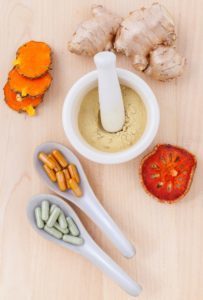
After you implement an anti-inflammatory diet, you can make some significant additional gains by supplementing appropriately. Supplements should be considered exactly as their name implies – a “supplement” to an already existing healthy anti-inflammatory diet. Supplementing, without also implementing the anti-inflammatory lifestyle, is like trying to put out a forest fire with only a fire extinguisher!
However, once an anti-inflammatory lifestyle is in place, supplementation is the polishing touch that makes all the difference. It’s the Zamboni over the ice. It is the smoothing out and fine-tuning of your body’s metabolic processes.
Of course, with nutritional supplementation, there are individual recommendations that need to be made. Below is a list of the key supplements which pair well with the anti-inflammatory diet, and are right for most everyone. Here’s a list of the key supplements to get you started:
- Multivitamin is your starting point
- Benefits: general anti-inflammatory benefits, protects DNA against oxidative stress, homocysteine reduction (homocysteine is implicated in atherosclerosis and alzheimer’s)
- Recommendation: Phytomulti (https://dyinh.metagenics.com/phytomulti)
- Magnesium
- Good for ATP synthesis (how we make energy usable in our bodies)
- Needed for the removal of all damaged DNA
- Helps connective tissue
- Helps with the structure and function of cartilage
- Adult male (400-420mg/day); Adult Female (310-320mg/day)
- Additionally, magnesium helps with sleep, which is a critical part of the tissue recovery process
- Recommendation: Magnesium Glycinate (https://dyinh.metagenics.com/mag-glycinate)
- Omega 3 DHA EPA (fish oils)
- Will help balance out the skewed ratio of omega 6 to omega 3 in the average American diet, bringing it closer to the ideal 1:1 ratio
- Minimum of 1 gram per day
- Recommendation: Omegagenics EPA – DHA 1000 (https://dyinh.metagenics.com/1222/omegagenics-epa-dha-1000)
- CoQ10
- We start having less available CoQ10 in our late 20’s early 30’s
- CoQ10 protects the mitochondria in our cells (the powerhouse of our cells)
- It’s an essential component in ATP synthesis (how we make energy usable in our bodies)
- Serves an important antioxidant function
- Minimum 100mg per day; No adverse effects have been shown with up to 200mg per day
- Recommendation: CoQ10 ST-100 (https://dyinh.metagenics.com/coq10-st-100)
Summary
The benefits of the anti-inflammatory diet are vast. You will accomplish an improved Omega 6 to Omega 3 ratio (average diet is 22:1 and ideal is 1:1), which helps your body attain an anti-inflammatory state. Blood sugar and tissue acidity become stabilized in an anti-inflammatory state. The increased potassium and phytonutrients in the diet create a protective buffer against the oxidative stress that your cells experience in all of the body’s biological processes.
All of these benefits can be summarized as decreased pain, decreased susceptibility to chronic disease, and increased energy levels and mood.
References
Bertoia, Monica L, et al. “Dietary flavonoid intake and weight maintenance: three prospective cohorts of 124 086 US men and women followed for up to 24 years.” Bmj, 2016, p. i17., doi:10.1136/bmj.i17.
Cassidy, A., et al. “Higher dietary anthocyanin and flavonol intakes are associated with anti-Inflammatory effects in a population of US adults.” American Journal of Clinical Nutrition, vol. 102, no. 1, 2015, pp. 172–181., doi:10.3945/ajcn.115.108555.
Seaman, David R. Clinical nutrition for pain, inflammation, and tissue healing. NutrAnalysis, Inc., 1998.
©CenterForMusculoskeletalFunction2017






